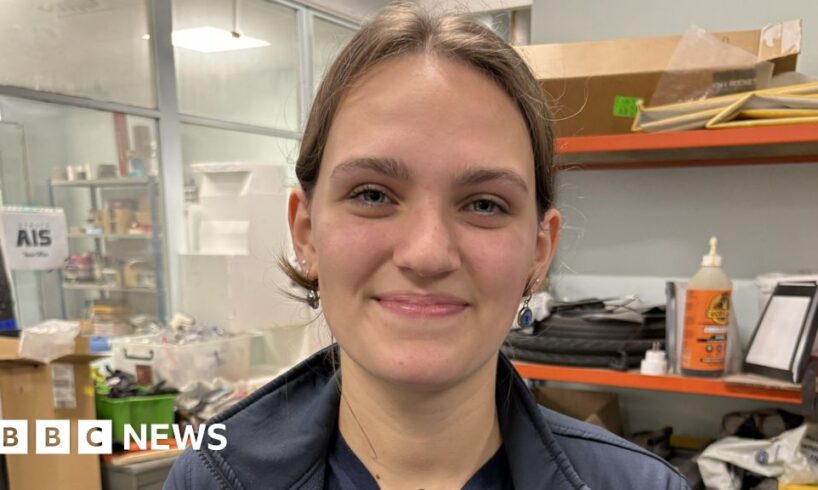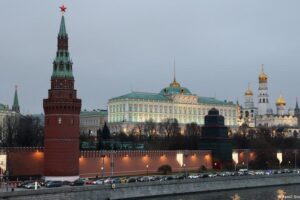
Daniel Bennett and Ian HamiltonBBC Scotland
BBC
Millie Brown didn’t know working in the space sector was an option
Millie Brown says she had never considered a career in the space industry.
The fourth-year mechanical engineering student at the University of Strathclyde didn’t think it was an option.
But now she says the people and companies she has met during her course have opened her eyes to opportunities – and to Scotland’s potential as a space leader.
There are about 8,000 people working in jobs in Scotland related to the space sector. But over the next 10 years, as Scotland becomes a regular location for launches, there is an ambition to push that to 20,000.
“The Scottish space sector is growing at a really quick rate, so the skills I’ve learned here are going to be really helpful going forward,” says Millie.
The first launches of satellites into orbit are expected from SaxaVord in Unst, Shetland in 2026. When operational, the spaceport is expected to launch up to 30 rockets per year.
So with that, and other projects around Scotland, staff are required in large numbers.
Derek Harris from Skyrora says there is a need for more specialist staff, but also for more general manufacturing roles
“There’s a vast gap in some major roles,” explains Derek Harris, business operations manager at rocket manufacturer, Skyrora.
A lot of them are specialist positions, like embedded engineers and system engineers, he explains, but they also need more traditional manufacturing workers, such as welders.
“All of these things are in demand by these (Scottish space companies) looking to grow.
“At present we have about 85 staff here in the facility in Cumbernauld. Once we scale up to do our launches on a commercial scale, that means we’ll need somewhere between 250 and 300 staff here,” Derek adds.
Andrew Strain has seen his company grow from two to 200 staff in 20 years.
Other space companies have seen and are expecting similar growth.
This includes satellite producer AAC Clyde Space – which formed out of a merger between Clyde Space and the Swedish company AAC Microtec in 2019.
Chief technical officer Andrew Strain points out that Clyde Space started making satellites 20 years ago with just two staff members.
“The company now for us is around 200 people across eight locations around the world,” he adds.
So where has this growth in staff come from?
“We have people coming from local colleges and universities, we have apprentices. We have people that have worked in parallel industries like assembly and manufacturing that we’ve picked up who have never worked in space before,” Andrew says.
Of the roughly 230 space companies and organisations operational in Scotland, they are often competing with sectors like renewables, oil and gas, defence, or manufacturing to secure workers.
“It’s an ever-evolving thing, it’s growing,” says Ingmar Kamalagharan, the UK Space Agency’s head of education and future workforce.
About 55,000 people work in the space sector across the UK.
He says: “The sector has grown massively over the past 10 years. If we project forwards 10 years, we’ll probably need the same number of people again.”
Students at the University of Strathclyde hope to go straight into the space industry
Some of those people are being trained and hope to be employed directly from university.
“I’ve been always passionate about space, I remember my seventh birthday cake was a space shuttle,” explains Farboud Foroughi, an engineering student at the University of Strathclyde.
Both he and classmate Anushka Bansode have ambitions to go directly into the Scottish space industry.
“I would like to become either a navigation and control engineer for satellites or a systems engineer for typical space systems,” says Farboud.
Anushka added: “When I was a kid, I was always interested in planets and the solar system and the galaxy and how it all works. And then later on, I got interested in engineering.
“I realised that I can combine these two and become a mechanical engineer who works in space.”
Dr Christie Maddock sees Scotland as an exciting location for students interested in space
A senior engineering lecturer at their university says Scotland is an exciting place for future workers.
“Scotland 15 years ago didn’t do any launch – 25 years ago, we didn’t make any satellites,” says Dr Christie Maddock.
“Now we do launch systems, there are two or three space ports. We do almost all the aspects of it.
“Space science, astronomy, radio telescopes. So the space sector is and will continue to be massive and growing.”
For Millie, a job in space is “definitely on the cards” but she says after a possible semester abroad, she may look at something overseas.
And the challenge for Scottish companies is to retain people in a competitive market.





